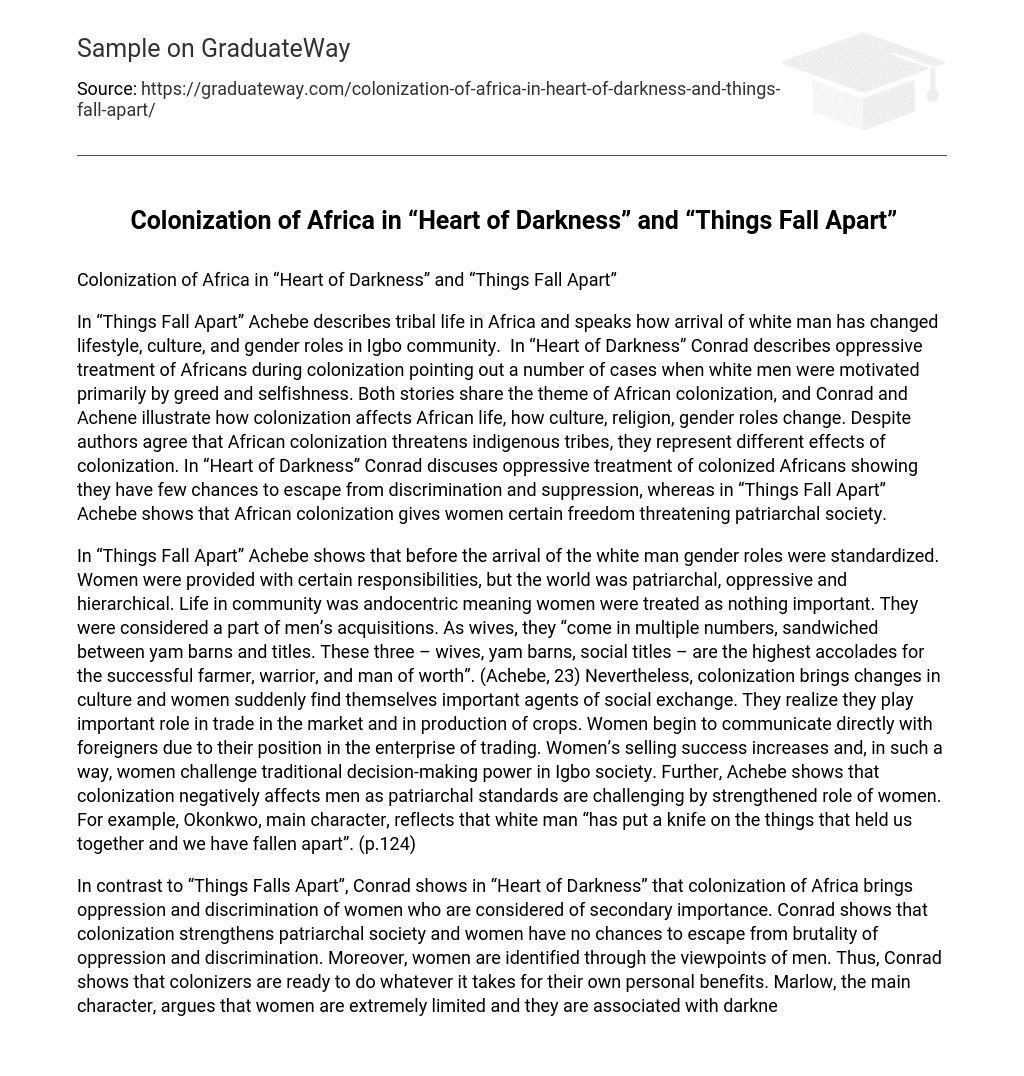In “Things Fall Apart” Achebe describes tribal life in Africa and speaks how arrival of white man has changed lifestyle, culture, and gender roles in Igbo community. In “Heart of Darkness” Conrad describes oppressive treatment of Africans during colonization pointing out a number of cases when white men were motivated primarily by greed and selfishness. Both stories share the theme of African colonization, and Conrad and Achene illustrate how colonization affects African life, how culture, religion, gender roles change. Despite authors agree that African colonization threatens indigenous tribes, they represent different effects of colonization. In “Heart of Darkness” Conrad discuses oppressive treatment of colonized Africans showing they have few chances to escape from discrimination and suppression, whereas in “Things Fall Apart” Achebe shows that African colonization gives women certain freedom threatening patriarchal society.
In “Things Fall Apart” Achebe shows that before the arrival of the white man gender roles were standardized. Women were provided with certain responsibilities, but the world was patriarchal, oppressive and hierarchical. Life in community was andocentric meaning women were treated as nothing important. They were considered a part of men’s acquisitions. As wives, they “come in multiple numbers, sandwiched between yam barns and titles. These three – wives, yam barns, social titles – are the highest accolades for the successful farmer, warrior, and man of worth”. (Achebe, 23) Nevertheless, colonization brings changes in culture and women suddenly find themselves important agents of social exchange. They realize they play important role in trade in the market and in production of crops. Women begin to communicate directly with foreigners due to their position in the enterprise of trading. Women’s selling success increases and, in such a way, women challenge traditional decision-making power in Igbo society. Further, Achebe shows that colonization negatively affects men as patriarchal standards are challenging by strengthened role of women. For example, Okonkwo, main character, reflects that white man “has put a knife on the things that held us together and we have fallen apart”. (p.124)
In contrast to “Things Falls Apart”, Conrad shows in “Heart of Darkness” that colonization of Africa brings oppression and discrimination of women who are considered of secondary importance. Conrad shows that colonization strengthens patriarchal society and women have no chances to escape from brutality of oppression and discrimination. Moreover, women are identified through the viewpoints of men. Thus, Conrad shows that colonizers are ready to do whatever it takes for their own personal benefits. Marlow, the main character, argues that women are extremely limited and they are associated with darkness, violence and brutality. Women roles are divided into the mother, the whore and the dutiful virgin. For example, Marlow’s mistress is described as “savage and superb, wild-eyed and magnificent; there was something ominous and stately in her deliberate progress”. (Conrad, 101) In contrast to “Things Fall Apart”, where men are still in dominant positions despite certain freedom of women, Conrad illustrates that African men are oppressed; they are enslaved to serve the white men. Colonizers exploit human labor forcing Africans to work for a minimum payment. Despite the spirit of bitterness is generated in the people, they realize little can be done to fight oppression.
“Things Fall Apart” and “Heart of Darkness” represent different effects of African colonization, but they show that colonization brings significant changes to culture, religion and, what is more important, to gender roles. In “Things Fall Apart”, women are growing of power, their status in trade has increased, gender relations are changing, and patriarchal society is loosing its initial significance. In contrast, in “Heart of Darkness”, colonization strengthens women oppression and subordination; women are easily controlled and dominated by men. Moreover, African men are oppressed as well. White imperialism brings imperialism and slavery into the continent.
Works Cited
Achebe, Chinua. Things Fall Apart. USA: Anchor Publishing, 1994.
Conrad, Joseph. Heart of Darkness. USA: Penguin Group, 1999.
Iyasere, Solomon. Understanding Things Fall Apart: Selected Essays and Criticism. Troy, NY: Whitston Publishing, 1998.





